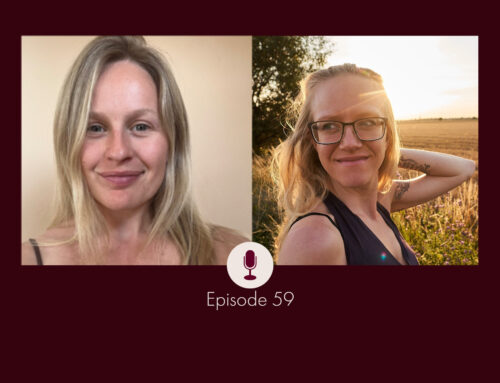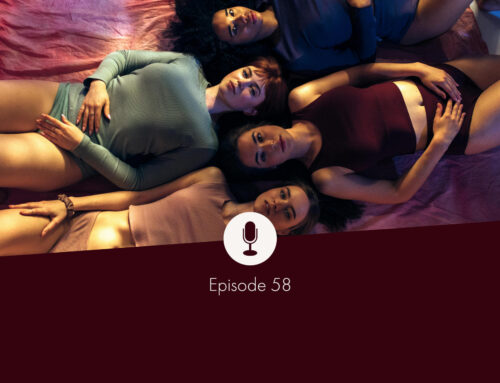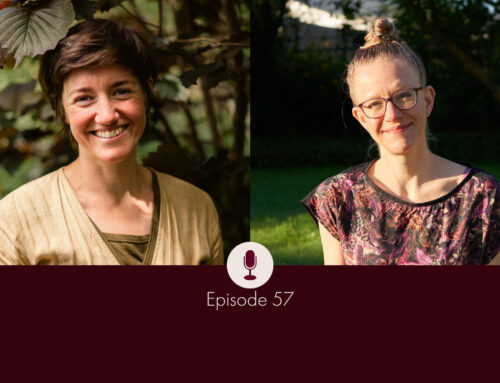Ixchel Lunar and I want to raise awareness about how the systems and structures we live in are heavily impacting our relationship to time and to the body, and how the pace of life is a social construct that works against us in so many different ways.
Subscribe on your favourite podcasting platform:
Apple Podcasts | Spotify | Google Podcasts | Amazon Music
Warning:
This and the following three episodes of this series are potentially activating to your nervous system, so please make sure that you are in a good space to absorb the information and have a soothing practice at hand that you can turn to, should your nervous system be activated!
We live in systems that aren’t set up for our benefit, but seek to separate us from ourselves, each other and the land we live on, so we extract from and exploit the Earth and our own bodies for other people’s gain. Ixchel Lunar and I want to raise awareness about how these systems and structures have really impacted our experience and perspective of time, and how the pace of life is a social construct that works against us in so many different ways.
Follow us in this four-week series where we dive deep into the topic and practices of decolonisation, especially how to decolonise time and the body, thereby opening opportunities for liberating and experiencing flow that brings healing to the individual as well as the collective.
In today’s introductory episode, we dive into:
- Ixchel’s background story of healing and recovering from burnout
- My background story of how learning about the cycles (the personal and the cycles around us) has helped me make peace with my anorexia and with my body
- Simple definitions of what colonisation and decolonisation actually mean and how they tie into the white supremacist capitalist narratives of our modern society
- Four core ways time has become colonised
- Tools to soothe and regulate your nervous system to help you move forward with this important work
Resources we mentioned:
Subscribe to Ixchel’s Dragon Letters on their homepage.
Subscribe to Mo(o)nday Musings to start each week more fully connected to yourself and your amazing body.
If you want to learn how to start communicating with your body, take my free Cycle Charting course here.
And if you experience menstrual health conditions like painful periods, PMS/PMDD, endometriosis, PCOS, irregular cycles, know that as a Menstrual Health Coach I help you address them in a natural and holistic way at their root cause (so without surgery or hormones), for a happy healthy bleeding experience. If you want to take your menstrual health into your own hands, book a call and let’s chat or send me an email, if you prefer a written conversation.
And I’m really happy to have you, Ixchel, here with me. Would you maybe like to introduce yourself, who you are, what you do, your work, your body of work, all of that.
[00:01:18] Ixchel: Wonderful. Thank you so much, Lisa. To be with you again, it’s always a delight to chat with you. Yeah, decolonising. I have been sort of working through my own decolonising and bumping against the system since a very young age. Being a neuro divergent, what I like to call a neuro emergent person, growing up in the United States, I’m currently living in Mexico, where some of my ancestors are from.But growing up in the United States and being a neuro emergent, really bumping into a lot of different systems that really reinforced my not belonging. And so that really sort of shaped the way that I saw the world and the way that I experienced the world and tried to navigate through the world as well.
And eventually, you know, grew up and did a lot of masking and a lot of trying to fit in to blend into society and to the structures that be and was able to go to school and raise my children. I have two children, I had them 17 and 18, very young.
And then eventually started getting involved in politics when I realized that so many of those structures were not benefiting me, or for me in the first place. And as someone that’s of mixed descent, being really cognisant of how those structures were preventing me from moving ahead in life and were not built for me.
And really thought that politics would be a way to start to make some shifts and changes that would make the world more accessible and more equitable for all people. And spent a good deal of time and energy in that place. And even ran for city council and was a vice mayor and was on a number of different boards and commissions and things throughout the San Francisco Bay area. But unfortunately was not able to get reelected because of some of my positions.
And so really spent a lot of time sort of coming to terms with the masking that I had done to be able to cope in that environment and the health impacts that had also become really very obvious to me, that the stressors and the masking and all of those things had really physically, and the experiences that I had gone through in my younger days had really impacted my body physically.
And so went through many years of recovery and healing and addressing burnout and through all of that came this awareness of how these systems and structures have really impacted our experience of time and our perspective of time and the way that the pace of life is a social construct that works against us in so many different ways.
And so that work really started becoming clearer and clearer as I lived in Nicaragua. I went to Nicaragua as a sabbatical and ended up staying there for six years and writing about revolutions and healing and all of that, and ancestral work and things like that. So all of that, really getting a sense of my experiences growing up, not fitting in and something that Kelly Diels has shared and some other folks have shared as well is that the thing that has been used against us can be our source of power.
So the things, our experiences, our life events, the ways that we have been treated can when we’re able to sort of alchemise that and really tap into it can become our superpowers. And that really stuck with me and it’s been something of a mantra for me as I really see the way that I experience time differently and see the way that time has been co-opted and flow has been co-opted by dominant culture. So yeah, that is sort of the depth and focus of the work that I do. I’m working with clients and coaching and helping them to find their rhythm and their flow.
[00:06:33] Lisa: And I already love how this shows that, well, time is not linear. It’s all an amalgamation and there are cycles and spirals and all of that, right? [00:06:45] Ixchel: Yeah. Yeah, it’s especially so in my indigenous background and the studies that I’ve done around different indigenous cultures, time is very hyper-local and very spiral. And so there are these rhythms and these seasons and these ways of being with time that are very different and can be misunderstood, I think, by dominant culture as well, which is definitely wants it to be a very linear construct. [00:07:22] Lisa: Yeah. And speaking of seasons and cycles and all of that, that’s well, my focus or the focus of my work for those of you listening or watching who don’t know me. And I have been coming to terms with all of that and the structures we live in within the past, I think, six years. I didn’t wake up sooner, but I am grateful that I woke up due to a severe mental health crisis where my OCD and my anorexia and orthorexia got the better of me.And I decided that I needed help and started to learn about the body, about the moon cycle, about the menstrual cycle, about these, basically the regenerative rhythms that we have built into our very bones that are not appreciated in the societies we live in very often. And really learning to live more in tune with my cycle.
And I like to speak about embodied cyclical living. So not “In this phase, you have to do XYZ and in that phase you have to do or to eat those kinds of food”, but more as an “Okay, today this is what I bring to the table. The energy my body has. This is how my mood is. With all that I’ve got on my plate, how can I honor how I am today?
And that has really helped me make peace with my anorexia, peace with my body, learn to appreciate my body and her rhythms. And also the rhythms and cycles of life and that everything is a spiral and we move through this beautiful process of death and rebirth. As women and menstruators, we do that every month.
And if you’re not menstruating and you’re not a woman, it might be that you are moving through this on a yearly rhythm or on a daily rhythm and every being is cyclical and every being’s cycle is different. And how cool is that? That we still get to live and figure out how to be together in relationship because I think time is also a relationship and it’s all about how to be in a good relationship with the body, with time, even with money, with everything out there.
And in that sense, in my work, I like to bring out the taboos, those things that we don’t talk about in the society. Also the taboo and stigma around menstruation and the menstrual cycle and the power it actually holds because what most people see today or think of when they think of their period or of period is, “Oh, the woman’s on her period. That must be why she’s so emotional.” or it’s, “Well, you’ve got pain. There’s nothing we can do. Take a pill or have surgery or whatever.”
And that’s not an answer. It’s the body telling us something. So we need to sit down, be still and listen and take the cues. And that brought me to this realisation, especially when I heard you speak about decolonising time, that actually, living in tune with your body is also a practice of decolonisation because, and we will get into colonisation and what that means in the first place in a moment, but our bodies have become these wild animals that we think we need to control or that society makes us believe we have to control and fit into a certain shape and size and whatnot. But they are of nature. You are of nature and nature doesn’t make mistakes.
[00:11:09] Ixchel: That’s beautiful. [00:11:11] Lisa: And since we are already there and today really serves as an introduction and setting the scene for the other three parts of the series that we are going to record, but what is your take on colonisation, what happened, how would you explain that and why is it important and a task for all of us to decolonise? [00:11:39] Ixchel: Yeah. So I like to give folks a really sort of simple definition of what colonisation and decolonisation are, to help create a framework of understanding. And you touched on it a little bit around relationship. And so colonisation is this 500, 600 year process, easily, if not even a little bit more, if we want to go back into European history a little bit more, of separating people from the land and from each other.And it’s that separation from the land and creating that duality of nature and not nature, basically, and human against nature that really sets the stage for the colonisation process throughout the world, both of humans through enslavement and the land itself in terms of the land becoming not something that we’re in relationship to, but a resource that we can extract and exploit. And so that way of being, of separation, of place and the land, each other, the cosmos is the sort of the ground from which colonisation moves ahead.
And so to decolonise then is actually repair. It’s coming back into relationship with the body, with the land, with time, with the cosmos, with the people around us in a reparative way. Repair is really at the core of that process because it’s taken us 500, 600 years to get to this place and in order to make societal changes, the indigenous are very aware that to make a lasting change can take seven generations.
And time-wise, we’re talking about 14 generations that this colonial project has been in existence. So in order to really be able to come back to the place of wholeness and connectedness with each other, with our bodies, with the land, with time and the cosmos, it’s going to take many, many generations for us to undo that harm and that colonisation.
So to really give ourselves some grace and some patience that we’re planting seeds for many, many generations ahead that are going to continue to care for the seeds that we’ve planted and to bring them into fruition over many, many generations.
And even that in and of itself gives us a bit of a way to relax our nervous systems, because a lot of times what happens for people when they start to understand the way the systems have created our current culture and lifestyles, there’s this… It’s part of the constructs of what are known as white supremacy characteristics, of like, “Oh, well then I have to fix it and save it.”
And in fact, we can’t do that. No one person is going to be able to fix or save us. It’s all of us doing all of our work separately and collectively to be able to bring these ways of being into existence over multi generations.
[00:15:46] Lisa: Yeah. And also you named already white supremacy, but there are all these things that play into it like capitalism in the form of extracting and exploiting people. I mean, we are even exploiting ourselves, our own bodies, our own minds, our own hearts in order to serve these systems that we often aren’t aware of, in the beginning, that they even exist.But once you see them, you can’t unsee them. And then of course, the racism that’s included, the ageism, old people are seen as useless basically and all of these things that play into colonialism.
And as you say, it’s a practice. It’s not always a comfortable one and that’s okay. And it takes time. There is no right and wrong. That’s also the binary that we are taught. There is a “right” way to do things and a “wrong” way to do things. What if there isn’t? Because we are all in this together and we have all been colonised and we all live under the influence of these systems that have been set in place.
And I think that’s why it’s so important to get together. As you said, it’s a personal thing, but also you and I are getting together. We are getting together in circles. Each time we sit in circle and we remind each other of what’s important here, there is some kind of healing happening. And I always tell my clients when I witness these shifts that are happening, “Hey, you are not even doing that just for yourself. It’s working the seven generations before you and after you, because what is changing in you right now is going to ripple out into your family, into your community.
It’s inevitable. And so the more people who are on this path, the better.
[00:17:47] Ixchel: Yeah, it’s definitely not linear. Learning is not a linear process and it never just impacts us individually. Our genetic information, our ancestors and our bones, all of that gets impacted when we do this work. And there is this piece around this uncomfortability that is very foreign to people nowadays because so much of dominant culture is about comfort of certain people, making comfort a huge priority for certain people. And so to do work that makes us uncomfortable goes against the social constructs themselves.And it’s unfamiliar. And something that I learned from my somatic facilitator, Luis Mojica of Holistic Life Navigation is that when something is unfamiliar, our nervous systems respond as if it’s a threat. And so to really be able to be aware of that nervous system response to working on things that are uncomfortable when we’re working on taboos or shadow subjects, things like that colonisation, it’s going to activate our nervous systems as if it is a threat.
And so even that in and of itself is a process to learn, to be comfortable with the discomfort and to learn to get familiar with it. So it doesn’t come across as a threat as we do this work. Hugely powerful, not only for our nervous systems, but then the ripple effects of what it will be able to create in terms of new ways of being and/or going back to older ways of being as well. So it’s so important.
[00:19:50] Yeah, and I mean, in order to grow, yes, you have to leave your comfort zone, but you need a place, a safe place that you know you can come back to at any point, because only then can growth be sustainable because otherwise you’re just in this fight and flight response and react instead of respond. So yeah, I’m definitely with you with this whole nervous system work, it’s so important.And to regulate the nervous system, you can just go outside into nature because nature has this very healing and soothing effect on our nervous system. And we can access that wherever.
[00:20:31] Yeah. It’s so important to be aware of one’s capacity, where your nervous system is at and what you’re able to sort of take on because that, you know, that pushing against the nervous system is a byproduct of colonisation as well. And so, you know, we can we can push and force ourselves along, but that actually isn’t doing the work or integrating the work of decolonising and repairing.And so it’s really important to be aware of capacity. And you hinted at that in terms of some of the work that you do as well, really being aware of capacity to be able to move through the world is so, so important for that ability to sustain ourselves and continue in doing this reparative work.
[00:21:31] Lisa: Now I was just thinking, maybe to close this introductory part, do you have some tip or tool to help folks soothe their nervous system? Because even just listening to all of this, if this is new to you, it can be extremely activating for your nervous system. And so do you have maybe I thought, maybe each of us shares a tool or some tip or something, so that folks, if they feel activated, they have something they can do or practice? [00:22:02] I wanted to share a sort of a framework, as people start to explore decolonising time to get a sense of what colonial time looks like. So there’s an awareness practice, as we become aware, that’s when the paradigm shift happens internally, and then we can start to do the reparative work from that. So I just wanted to give a brief framework of what colonial time looks like. And basically, there are five sort of core ways that time gets colonised.And so the first way is that it gets stolen. So not everybody has the same access to time. Because of the colonial structures, people are excluded from time, which is a way of having time stolen from us. So there are many people who are excluded, people of color, BIPOC, people who are basically stricken from the historical record, women and women’s achievements throughout time as well are being not included.
And that’s shifting. Both of those things are really starting to shift, I would say, in the last 50 years or so. But historically, that has been one way that time has been colonised.
And then it’s been divided and perfected. And so one of the ways that you can be really aware of time is the calendar. So the way that we sort of live our lives by the calendar. And the 24-hour clock system as well. And the way that we are expected to show up within colonial time because of that division and perfection of time. And on the flip side, it’s a construct.
Time isn’t something that you can necessarily divide or perfect. It’s a natural system. We’re a planet moving in a solar system, moving in a galaxy. And so it’s a very different way of thinking of time in that spiral way.
And then it’s been commodified. Time has been commodified in that because of our separation from land, we are unable to be in relationship with the land to care for ourselves. So we have to go out and work for a job, which is typically paid by the hour. So there’s this connection that happens between all of these facets of colonial time.
And then time has been outsourced. And that outsourcing is the way that we have looked at the land itself as a resource. And so much of our current colonial projects that are still — colonisation hasn’t stopped. It’s still happening. And one of the ways that you can be aware of that is particularly with the rare earth minerals that are in our devices. And the way that these rare earth minerals and rocks and all of that extractive behaviour of colonisation to extract these resources for production, is taking away the natural progression of how those resources would exist on the planet.
And when we turn a resource, matter, we change matter into something else, we’re actually outsourcing the entropy, which is actually reducing the time. So if we think of the entire planet as this deep amount of matter that exists, like all the matter that exists, has its natural decay. And when we speed that up through extraction, we’re actually releasing the natural amount of time that the planet has. So that’s that outsourcing concept.
So those are the four main points to think about as you start to think about “Where am I bumping up against colonisation?”
And then the practice to be able to settle the nervous system that I think is so helpful for people is to go outside. And if you can, depending upon what season you’re in, or at least look out a window, at the very least if it’s cold where you are, that sort of thing when you’re listening.
But to have a daily practice where you’re really connecting with the world around you and starting to observe and sense how time is behaving, seasons are occurring in the world around you in your immediate vicinity. And that’s a way that you can start to connect into what the indigenous like to call that sort of hyper-local time. That’s different.
One way that people can start to think about time being hyper-local is the difference, if you’ve ever been able to travel long distances, you’ll have a sense that one place has a feel to it that is different from another place. For instance, most people in the United States will know that New York feels very different from Southern California, for instance, very different paces of life.
And that’s the hyper-locality that time sort of takes in different areas. So you can start to become aware of that. And then as you’re moving through life, if you’ve had this paradigm shift of “Goodness, time is colonised!” and how you’re bumping up against those structures of time, colonial time, just to be aware of them and then deepen into the practice of being in the now where you are.
[00:28:25] Lisa: Thank you. And while you were speaking, I was reminded of these two different words in Greek. There is “Chronos time” and “Kairos time.” So “Chronos,” the linear, measurable time that flows in one stream. And then “Kairos,” this kind of quality time, that moment where we forget everything about time, where time has its own quality, is its own entity, has its own way of flowing or contracting or expanding, depending on what we are doing.And sometimes just realising, “Oh, I am kind of– my life is hectic because I run after the clock and I try to follow this chronological order of time.”” Or am I really in the here, in the now, experiencing what time is like in this moment? So it reminded me a little bit of that.
And the practice that I would like to give is simple, it’s also available wherever whenever, it’s your breath. Sitting down. I know it’s the hardest thing to do when you feel pressured by time or by to-dos and still, sitting down, spine straight, or lying down even, spine straight, closing the eyes, and using your diaphragm to breathe.
The diaphragm sits at the bottom of the ribcage. And it’s this muscle that, when used, extends into the belly. So sometimes it’s called belly breathing because your belly starts protruding outwards. And on the out breath, it moves back into its original position and the belly comes in again. And just focusing on using the diaphragm to breathe. And what that does is it stimulates the gut. It stimulates the organ. It stimulates the vagus nerve, which is the main nerve in your body for relaxation. And so by influencing your body and this vagus nerve, your brain will automatically start to calm down.
And that’s like, I mean, who has done yoga knows about the power of the breath, but I didn’t understand just how powerful it was until I did my training in female pelvic health. It’s just so essential. And it’s breath, so easily doable, wherever you are.
[00:31:00] Ixchel: That’s beautiful. [00:31:02] Lisa: Yeah, thank you. So I’d say let’s leave it here for today to not overwhelm folks. And we will dive into the nitty gritty of how to decolonise time in the next episode, so stay tuned for that.Until then, if you would like to stay in touch with Ixchel or with me, or with both of us, I will link to our respective emails and newsletters. Yours is the Dragon Letter, mine is the Mo(o)nday Musings. I will link to that so folks can sign up.
And we would be very interested to know and learn what you’ve learned, what you’re taking away from this episode. So if you feel inclined to reach out and let us know on socials, via email, whatever you feel comfortable with, let us know what you’re taking away from this first introductory session today.
Thank you so much for listening or for watching and speak to you next time. Thank you, Ixchel, for being here.
[00:32:06] Ixchel: Thank you so much, Lisa. Looking forward to future chats. [00:32:08] Lisa: Speak soon.


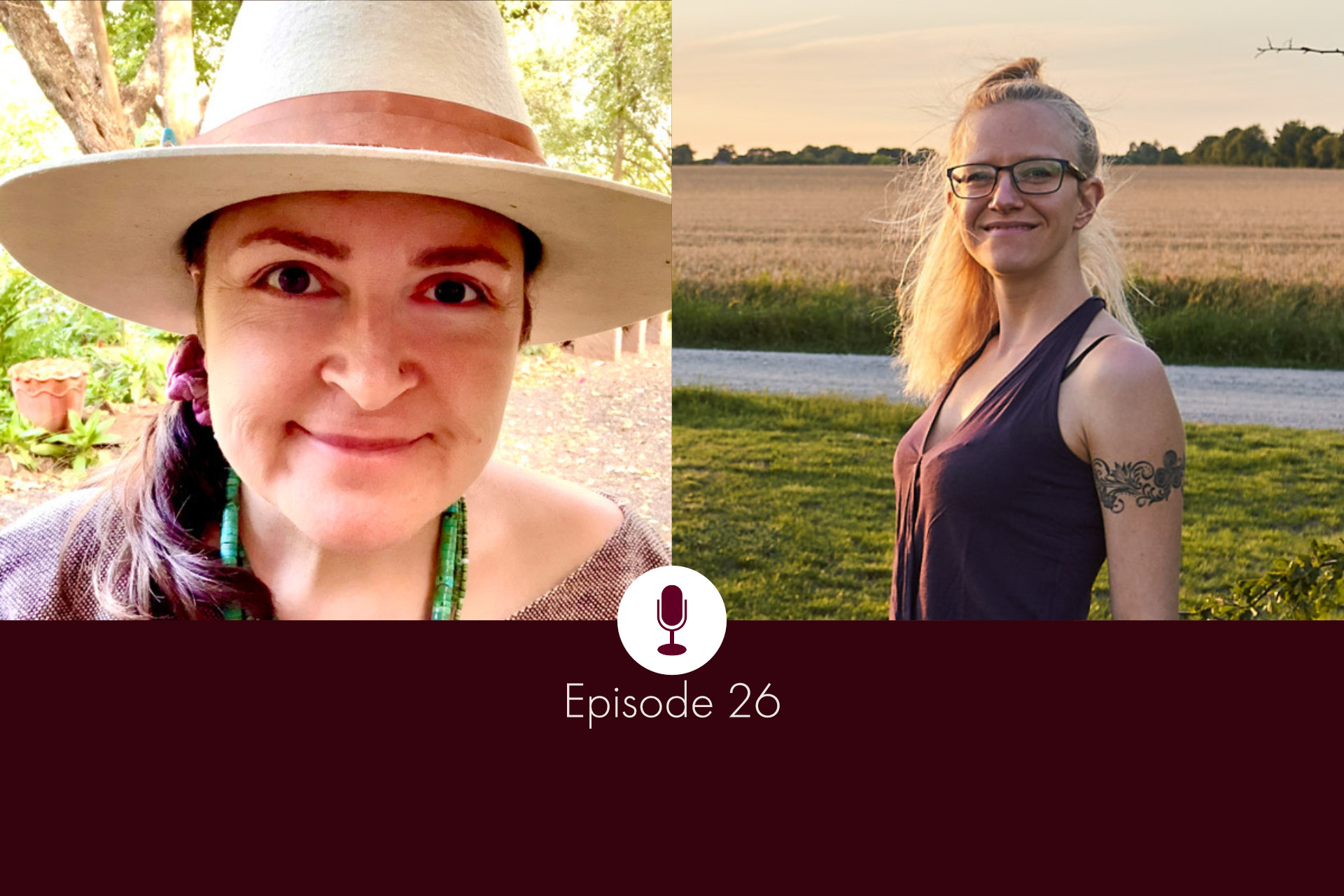
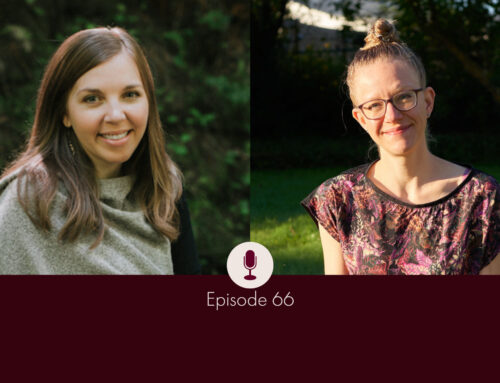
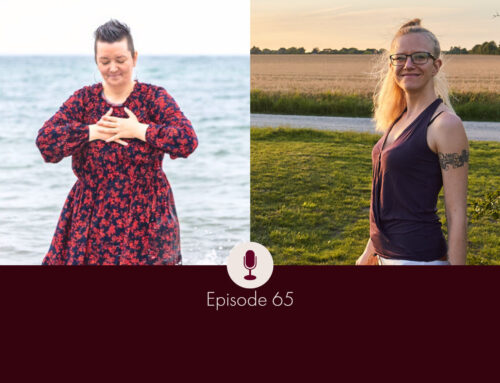
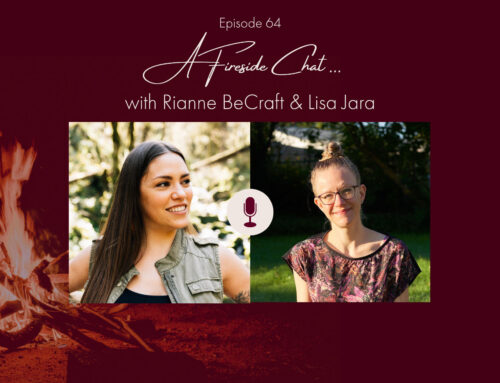
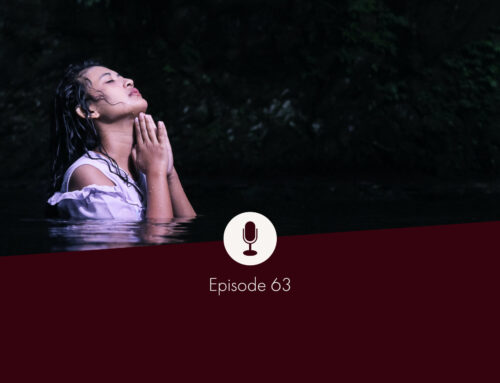
![Soothing the Inner Child to reduce Emotional Eating [Live Coaching]](https://lisa-jara.com/wp-content/uploads/2024/07/Womb-Whispers_Episode-60-Live-Coaching-Soothing-the-Inner-Child-to-reduce-Emotional-Eating_Beitrag-500x383.jpg)
